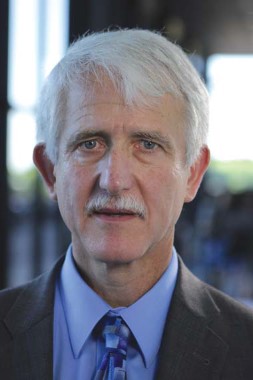User login
CHICAGO – Weekly paclitaxel is just as efficacious as dose-dense paclitaxel when it comes to adjuvant chemotherapy for breast cancer, but the weekly schedule has lower rates of certain important toxicities, according to data presented at the annual meeting of the American Society of Clinical Oncology.
The Southwest Oncology Group’s S0221 randomized trial tested combination chemotherapy regimens among 3,294 patients who had completed local therapy for early breast cancer.
Half of the patients received lower-dose paclitaxel (Taxol) weekly for twelve cycles, while the other half received standard-dose paclitaxel every 2 weeks for six cycles according to a dose-dense schedule. The dose-dense schedule used in the trial was longer than the standard dose-dense schedule (six cycles vs. four cycles) so that the groups would be on treatment for the same total duration (12 weeks).
The 5-year rate of disease-free survival was equally high, about 80%, with each schedule, reported lead study author Dr. G. Thomas Budd, a medical oncologist at the Cleveland Clinic. The weekly schedule, however, yielded significantly lower rates of grade 3/4 musculoskeletal pain, allergy, and neurotoxicity.
"Either schedule of administration can be recommended based on efficacy, so in practice, treatment can be selected based on other considerations such as toxicity. ... It can be individualized by the patient and their physician," he said. "I think there will be a move to more weekly treatment since hematopoietic growth factor support is not required."
Treatment duration and frequency also might tip the decision one way or another for some patients, he added in a related press briefing, as patients given paclitaxel every 2 weeks with the current practice of four cycles will finish chemotherapy sooner, and patients on the weekly schedule will have to travel to the infusion center more often.
"I think that it’s remarkable that after two decades [since paclitaxel’s approval] we are still asking questions on how to teach an old dog new tricks, so to speak," commented Dr. Andrew D. Seidman, moderator of the press briefing and a medical oncologist at Memorial Sloan-Kettering Cancer Center in New York.
"For me, this is actually going to change my practice because I have generally given" paclitaxel every 2 weeks, he said. "These data suggest to me that I can get the same benefit with less toxicity [with the weekly schedule], possibly with less cost. Although there was no formal economic analysis, the cost of growth factor support is not trivial."
In addition, "there are patients for whom fine motor skills are very important to their livelihood, and they will be happy to hear this news" about less neurotoxicity with weekly scheduling, he said.
The S0221 trial enrolled patients with stage I-III breast cancer who had received adequate local therapy (resection and radiation therapy). Investigators randomized them twice with a factorial design.
The first randomization was for a doxorubicin and cyclophosphamide schedule – investigational (weekly) versus standard (every 2 weeks). This randomization was discontinued because the investigational schedule was not more efficacious; all patients thereafter received the standard schedule, according to Dr. Budd.
The second randomization was for the schedule of paclitaxel – either a lower-dose weekly schedule (80 mg/m2 every week × 12 weeks) or a dose-dense schedule (175 mg/m2 every 2 weeks × 6 weeks) – with granulocytecolony-stimulating factor (pegfilgrastim) support.
Efficacy results showed that the weekly and every-2-week schedules yielded statistically indistinguishable estimated 5-year disease-free survival (82% for the former and 81% for the latter).
"Since this was not conducted as a noninferiority study, we cannot make a conclusion about the lack of difference. However, the Kaplan-Meier curves and the computed hazard ratios suggest little difference in efficacy between these two arms," Dr. Budd commented.
There was also no significant difference between the paclitaxel schedules in overall survival; median values have not been reached.
The findings were generally similar in patient subgroups stratified according to tumor hormone receptor and HER2 status, and, within the HER2-positive group, according to receipt of trastuzumab (Herceptin).
There was no significant difference in the overall rate of grade 3/4 adverse events with the weekly versus every-2-week schedules (35% vs. 36%), but there were differences in rates of individual types of events.
The weekly schedule was associated with significantly lower rates of allergic reaction (0.6% vs. 1.4%), musculoskeletal pain (3% vs. 11%), and neurotoxicity (10% vs. 17%), although the difference in neurotoxicity may have been smaller had the patients in the dose-dense group received only four cycles of every-2-week paclitaxel (as is current practice) rather than six cycles, Dr. Budd acknowledged.
On the flip side, the weekly schedule was associated with significantly higher rates of grade 3/4 hematologic toxicity (17% vs. 6%), leukopenia (6% vs. 1%), and neutropenia (11% vs. 2%). It’s important to remember, however, that "these patients had their counts checked more frequently, they did not receive hematopoietic growth factors, and the rates of infectious complications were not different between the two arms," he said.
The investigators have not performed a formal pharmacoeconomic analysis, according to Dr. Budd, but "the weekly schedule is somewhere between a third and two-thirds less expensive, just on the basis of calculating drug costs."
Dr. Budd disclosed that he is a consultant to Amgen, maker of pegfilgrastim (Neulasta).
CHICAGO – Weekly paclitaxel is just as efficacious as dose-dense paclitaxel when it comes to adjuvant chemotherapy for breast cancer, but the weekly schedule has lower rates of certain important toxicities, according to data presented at the annual meeting of the American Society of Clinical Oncology.
The Southwest Oncology Group’s S0221 randomized trial tested combination chemotherapy regimens among 3,294 patients who had completed local therapy for early breast cancer.
Half of the patients received lower-dose paclitaxel (Taxol) weekly for twelve cycles, while the other half received standard-dose paclitaxel every 2 weeks for six cycles according to a dose-dense schedule. The dose-dense schedule used in the trial was longer than the standard dose-dense schedule (six cycles vs. four cycles) so that the groups would be on treatment for the same total duration (12 weeks).
The 5-year rate of disease-free survival was equally high, about 80%, with each schedule, reported lead study author Dr. G. Thomas Budd, a medical oncologist at the Cleveland Clinic. The weekly schedule, however, yielded significantly lower rates of grade 3/4 musculoskeletal pain, allergy, and neurotoxicity.
"Either schedule of administration can be recommended based on efficacy, so in practice, treatment can be selected based on other considerations such as toxicity. ... It can be individualized by the patient and their physician," he said. "I think there will be a move to more weekly treatment since hematopoietic growth factor support is not required."
Treatment duration and frequency also might tip the decision one way or another for some patients, he added in a related press briefing, as patients given paclitaxel every 2 weeks with the current practice of four cycles will finish chemotherapy sooner, and patients on the weekly schedule will have to travel to the infusion center more often.
"I think that it’s remarkable that after two decades [since paclitaxel’s approval] we are still asking questions on how to teach an old dog new tricks, so to speak," commented Dr. Andrew D. Seidman, moderator of the press briefing and a medical oncologist at Memorial Sloan-Kettering Cancer Center in New York.
"For me, this is actually going to change my practice because I have generally given" paclitaxel every 2 weeks, he said. "These data suggest to me that I can get the same benefit with less toxicity [with the weekly schedule], possibly with less cost. Although there was no formal economic analysis, the cost of growth factor support is not trivial."
In addition, "there are patients for whom fine motor skills are very important to their livelihood, and they will be happy to hear this news" about less neurotoxicity with weekly scheduling, he said.
The S0221 trial enrolled patients with stage I-III breast cancer who had received adequate local therapy (resection and radiation therapy). Investigators randomized them twice with a factorial design.
The first randomization was for a doxorubicin and cyclophosphamide schedule – investigational (weekly) versus standard (every 2 weeks). This randomization was discontinued because the investigational schedule was not more efficacious; all patients thereafter received the standard schedule, according to Dr. Budd.
The second randomization was for the schedule of paclitaxel – either a lower-dose weekly schedule (80 mg/m2 every week × 12 weeks) or a dose-dense schedule (175 mg/m2 every 2 weeks × 6 weeks) – with granulocytecolony-stimulating factor (pegfilgrastim) support.
Efficacy results showed that the weekly and every-2-week schedules yielded statistically indistinguishable estimated 5-year disease-free survival (82% for the former and 81% for the latter).
"Since this was not conducted as a noninferiority study, we cannot make a conclusion about the lack of difference. However, the Kaplan-Meier curves and the computed hazard ratios suggest little difference in efficacy between these two arms," Dr. Budd commented.
There was also no significant difference between the paclitaxel schedules in overall survival; median values have not been reached.
The findings were generally similar in patient subgroups stratified according to tumor hormone receptor and HER2 status, and, within the HER2-positive group, according to receipt of trastuzumab (Herceptin).
There was no significant difference in the overall rate of grade 3/4 adverse events with the weekly versus every-2-week schedules (35% vs. 36%), but there were differences in rates of individual types of events.
The weekly schedule was associated with significantly lower rates of allergic reaction (0.6% vs. 1.4%), musculoskeletal pain (3% vs. 11%), and neurotoxicity (10% vs. 17%), although the difference in neurotoxicity may have been smaller had the patients in the dose-dense group received only four cycles of every-2-week paclitaxel (as is current practice) rather than six cycles, Dr. Budd acknowledged.
On the flip side, the weekly schedule was associated with significantly higher rates of grade 3/4 hematologic toxicity (17% vs. 6%), leukopenia (6% vs. 1%), and neutropenia (11% vs. 2%). It’s important to remember, however, that "these patients had their counts checked more frequently, they did not receive hematopoietic growth factors, and the rates of infectious complications were not different between the two arms," he said.
The investigators have not performed a formal pharmacoeconomic analysis, according to Dr. Budd, but "the weekly schedule is somewhere between a third and two-thirds less expensive, just on the basis of calculating drug costs."
Dr. Budd disclosed that he is a consultant to Amgen, maker of pegfilgrastim (Neulasta).
CHICAGO – Weekly paclitaxel is just as efficacious as dose-dense paclitaxel when it comes to adjuvant chemotherapy for breast cancer, but the weekly schedule has lower rates of certain important toxicities, according to data presented at the annual meeting of the American Society of Clinical Oncology.
The Southwest Oncology Group’s S0221 randomized trial tested combination chemotherapy regimens among 3,294 patients who had completed local therapy for early breast cancer.
Half of the patients received lower-dose paclitaxel (Taxol) weekly for twelve cycles, while the other half received standard-dose paclitaxel every 2 weeks for six cycles according to a dose-dense schedule. The dose-dense schedule used in the trial was longer than the standard dose-dense schedule (six cycles vs. four cycles) so that the groups would be on treatment for the same total duration (12 weeks).
The 5-year rate of disease-free survival was equally high, about 80%, with each schedule, reported lead study author Dr. G. Thomas Budd, a medical oncologist at the Cleveland Clinic. The weekly schedule, however, yielded significantly lower rates of grade 3/4 musculoskeletal pain, allergy, and neurotoxicity.
"Either schedule of administration can be recommended based on efficacy, so in practice, treatment can be selected based on other considerations such as toxicity. ... It can be individualized by the patient and their physician," he said. "I think there will be a move to more weekly treatment since hematopoietic growth factor support is not required."
Treatment duration and frequency also might tip the decision one way or another for some patients, he added in a related press briefing, as patients given paclitaxel every 2 weeks with the current practice of four cycles will finish chemotherapy sooner, and patients on the weekly schedule will have to travel to the infusion center more often.
"I think that it’s remarkable that after two decades [since paclitaxel’s approval] we are still asking questions on how to teach an old dog new tricks, so to speak," commented Dr. Andrew D. Seidman, moderator of the press briefing and a medical oncologist at Memorial Sloan-Kettering Cancer Center in New York.
"For me, this is actually going to change my practice because I have generally given" paclitaxel every 2 weeks, he said. "These data suggest to me that I can get the same benefit with less toxicity [with the weekly schedule], possibly with less cost. Although there was no formal economic analysis, the cost of growth factor support is not trivial."
In addition, "there are patients for whom fine motor skills are very important to their livelihood, and they will be happy to hear this news" about less neurotoxicity with weekly scheduling, he said.
The S0221 trial enrolled patients with stage I-III breast cancer who had received adequate local therapy (resection and radiation therapy). Investigators randomized them twice with a factorial design.
The first randomization was for a doxorubicin and cyclophosphamide schedule – investigational (weekly) versus standard (every 2 weeks). This randomization was discontinued because the investigational schedule was not more efficacious; all patients thereafter received the standard schedule, according to Dr. Budd.
The second randomization was for the schedule of paclitaxel – either a lower-dose weekly schedule (80 mg/m2 every week × 12 weeks) or a dose-dense schedule (175 mg/m2 every 2 weeks × 6 weeks) – with granulocytecolony-stimulating factor (pegfilgrastim) support.
Efficacy results showed that the weekly and every-2-week schedules yielded statistically indistinguishable estimated 5-year disease-free survival (82% for the former and 81% for the latter).
"Since this was not conducted as a noninferiority study, we cannot make a conclusion about the lack of difference. However, the Kaplan-Meier curves and the computed hazard ratios suggest little difference in efficacy between these two arms," Dr. Budd commented.
There was also no significant difference between the paclitaxel schedules in overall survival; median values have not been reached.
The findings were generally similar in patient subgroups stratified according to tumor hormone receptor and HER2 status, and, within the HER2-positive group, according to receipt of trastuzumab (Herceptin).
There was no significant difference in the overall rate of grade 3/4 adverse events with the weekly versus every-2-week schedules (35% vs. 36%), but there were differences in rates of individual types of events.
The weekly schedule was associated with significantly lower rates of allergic reaction (0.6% vs. 1.4%), musculoskeletal pain (3% vs. 11%), and neurotoxicity (10% vs. 17%), although the difference in neurotoxicity may have been smaller had the patients in the dose-dense group received only four cycles of every-2-week paclitaxel (as is current practice) rather than six cycles, Dr. Budd acknowledged.
On the flip side, the weekly schedule was associated with significantly higher rates of grade 3/4 hematologic toxicity (17% vs. 6%), leukopenia (6% vs. 1%), and neutropenia (11% vs. 2%). It’s important to remember, however, that "these patients had their counts checked more frequently, they did not receive hematopoietic growth factors, and the rates of infectious complications were not different between the two arms," he said.
The investigators have not performed a formal pharmacoeconomic analysis, according to Dr. Budd, but "the weekly schedule is somewhere between a third and two-thirds less expensive, just on the basis of calculating drug costs."
Dr. Budd disclosed that he is a consultant to Amgen, maker of pegfilgrastim (Neulasta).
AT THE ASCO ANNUAL MEETING 2013
Major finding: Compared with dose-dense paclitaxel, weekly paclitaxel yielded similar disease-free survival but significantly lower rates of grade 3/4 allergic reaction, musculoskeletal pain, and neurotoxicity.
Data source: A randomized phase III trial of adjuvant chemotherapy regimens among 3,294 patients with locally treated early breast cancer (SWOG S0221).
Disclosures: Dr. Budd disclosed that he is a consultant to Amgen.


